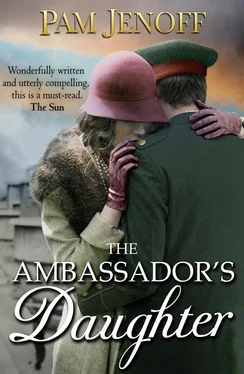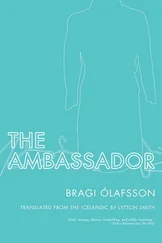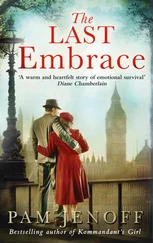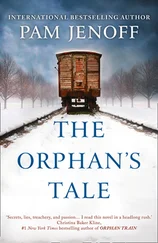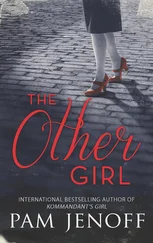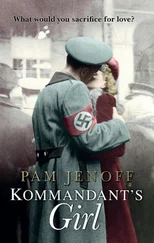“They should be here soon,” I say. Papa does not answer. He had not wanted to be here today—or at all for that matter. He had tried to lure me away with an excursion to Paris. But I had insisted that we stay, despite his derisiveness of what he called the “circus of shame.” He does not stand at the window himself, but busies himself at the desk. How can he not look?
The topic had come up at a dinner party three weeks earlier when it was announced that the Germans had finally been summoned to the conference. “You’ll move over to Versailles now, of course, and stay with the delegation?” someone asked Papa. Until that point we had enjoyed our neutral status, not being identified too closely with any one camp, including the defeated. But when a telegram came from the head of the delegation inviting us to relocate, Papa could avoid it no longer. So we left the city for this dreary little suburb of Versailles, though he still commutes almost daily to the conference proceedings at the ministry in Paris.
Our apartment is just across the road and down a bit from the hotel. The location, close by the German residence but not within, reflects the delicate role Papa must play. The conference does not trust him because he is German. The German delegation will surely not accept Papa because he has been part of the conference. We are an island.
“I’m going to market,” I say, unable to stand the confinement of the apartment any longer and eager to get a closer view. Unlike the hotel in Paris, there’s no kitchen to deliver our meals and the town’s few remaining restaurants are dismal affairs, so it falls to me to procure what we need.
I hold my breath, waiting for Papa to see through my excuse—the shops are likely to be closed now with the arrival. But he does not. Papa has been more preoccupied than ever these past few months since the attempt on Clemenceau’s life. Though the French prime minister recovered quickly and the story faded from the newspapers, it continued to hang over Papa and me, a silent dagger.
I almost told Papa that night that it was my fault. “Quite a shock,” he’d remarked. “Clemenceau will be fine, even joked as they were taking him to the hospital about the madman’s poor marksmanship. But it is a sobering reminder to us all that even while we are here working toward the new world, there are those who would derail it.” His brow furrowed.
“What is it? Is there something more?”
“Not at all.”
“You don’t need to shield me. I’m not a child.”
He smiled. “No, of course not. I never like to trouble you and give pause to your beautiful smile, even for a moment. It’s just that this may cause trouble for me. Cottin—the would-be assassin—was upset about French opposition to the Pan-Slavic state. We had been trying to keep it a secret so the media controversy would not keep us from getting the matter done. The assassination attempt, the timing of it, gives rise to suspicions that someone had leaked information about the vote.”
“But surely no one could think that you had a role.”
Papa, the only German detailed to the conference, not to mention a Jew, feared himself a likely scapegoat. I watched his face, wondering if he suspected me, or was perhaps even hinting. But he could not imagine that I would have betrayed him in such a fashion. “I appreciate your outrage on my behalf. It will be fine.”
Though the accusations had never become overt, there had been a quiet distancing between Papa and some of the other conference advisors that made our sojourn to Versailles almost a relief.
Studying Papa now, my guilt rises anew. Only I know the truth—that it was my careless remark, overheard at the bar, which gave Cottin the information to act. I have never been good at keeping secrets from Papa and I have struggled for months not to blurt out what I had done, to seek his forgiveness. But he has enough to deal with right now and I won’t strain his health further.
Down on the street, the morning air is warming and a bit stale with gutter stench. Across the road the hulking Versailles palace sits with its endless fountains and gardens, swallowing the tiny town below.
I walk around the side of the apartment building to the garden I planted. When we’d arrived, the dirt patch had been overrun by weeds. “I could tend to it,” I suggested. “Make the place come back to life a little.”
“A fine idea,” Papa said quickly. Gardening, if done properly without too much strain, is an acceptable avocation for women. “Though we’re hardly likely to be here long enough to see things grow.”
“Then it will be here for others,” I replied stubbornly. I’d planted flowers, tulips and other perennials that I hoped would blossom for years even after we were gone, something beautiful to leave behind. One of the plants has fallen, I notice. I dig my hands deep into the soil, savoring the buried warmth. Then I stand too quickly, my hands creating a smear of dirt across my dress.
I make my way down the cobblestone lane in the opposite direction from the crowds at the hotel, in case Papa is watching out the window. I head toward the market, skirting the edge of the park that sits at the end of the street. I have come to know the quiet rhythm of this part of the town through my days here—the old woman who sits at the corner with her poodle as if waiting for a bus that will not come, the two men who appear every morning at seven to slip schnapps into their coffees and sit wordlessly for twenty minutes before getting up and going in opposite directions. Are they brothers, cousins, friends? Was their routine always like this or was it disrupted during the war?
Gazing down the path into the park, I am reminded of Krysia. I’ve not seen her since we came out here. Versailles is at least twenty-five kilometers away from Paris, too far for an impromptu excursion into the city.
Stopping short of the market, where most of the stalls are indeed closed, I double back around the block to the hotel. The crowd has thickened now, a low murmur of expectancy crackling through the onlookers. Moments later, three buses appear on the road, old coaches belching smoke and making such noise that it seems questionable whether they will make the last ten meters of the trip. A truck rides ahead of the buses. It lurches to a stop then dumps a bunch of boxes in the hotel courtyard as unceremoniously as though they are garbage. Studying closer, I can see that it is luggage, once-fine suitcases now covered with dust and grime.
The bus doors open and the German delegation begins to emerge. They are bureaucrats, stooped older men, thin and paunched, bald and bearded, indistinguishable from the other nations’ delegates, but for their low shoulders and downcast eyes. They shuffle forward to face the indignity of sorting through the luggage, each to find and carry his own.
A boy lets forth a jeer. I brace myself for the rest of the onlookers to join him. Instead, the crowd is silent, their eyes boring into the Germans with pure hatred. Insults would have almost been better. This is why Papa sits at his desk, why he cannot bear to watch. This is not peace or even armistice, but rather the thinnest of truces, scarcely concealing the hatred of the war still bubbling beneath the surface.
A man steps from the last coach behind the others. He is younger, I can tell, even beneath the cloak of his naval coat and hat. Papa had mentioned someone military. My first impression is of a hawk. Steely blue eyes take in the crowd. I’m reminded of the soldiers I saw so often on the Paris streets. Even out of uniform I can spot it—the anxiousness, searching the corners for a cellar or other hiding place, as though the air before him might at any moment explode with grenades and mustard gas.
He starts forward, walking with his shoulders squared, seeming to clear the path ahead of him as he goes. Then his head lifts slightly and his eyes flick in my direction and I can swear, though I am one in a crowd of hundreds, he is looking directly at me.
Читать дальше
